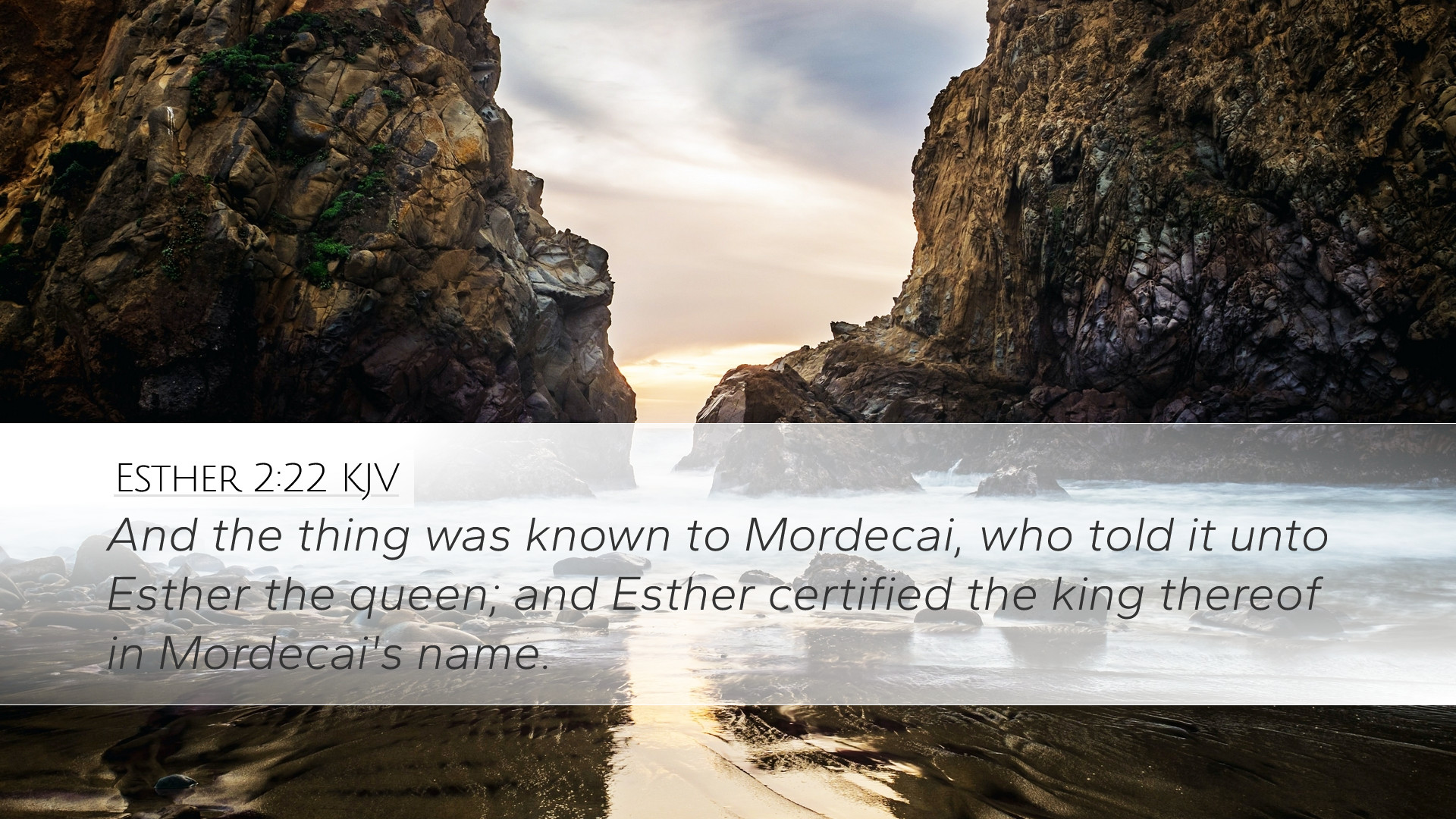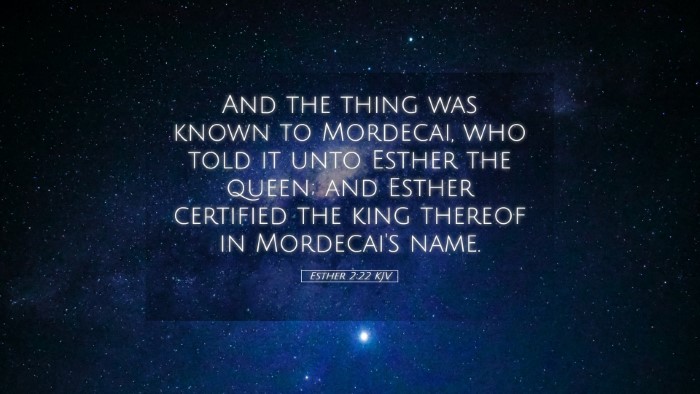Old Testament
Genesis Exodus Leviticus Numbers Deuteronomy Joshua Judges Ruth 1 Samuel 2 Samuel 1 Kings 2 Kings 1 Chronicles 2 Chronicles Ezra Nehemiah Esther Job Psalms Proverbs Ecclesiastes Song of Solomon Isaiah Jeremiah Lamentations Ezekiel Daniel Hosea Joel Amos Obadiah Jonah Micah Nahum Habakkuk Zephaniah Haggai Zechariah MalachiEsther 2:22
Esther 2:22 KJV
And the thing was known to Mordecai, who told it unto Esther the queen; and Esther certified the king thereof in Mordecai's name.
Esther 2:22 Bible Commentary
Bible Commentary on Esther 2:22
Verse Text: "But Esther had not yet revealed her kindred nor her people; as Mordecai had charged her: for Esther did the commandment of Mordecai, like as when she was brought up with him."
Contextual Overview
The Book of Esther is a unique narrative within the Old Testament, focusing on the providential workings of God through the lives of its characters in a foreign land, specifically during the Persian Empire. Esther, an orphaned Jewish girl raised by her cousin Mordecai, becomes queen and unknowingly plays a crucial role in the survival of her people. In this verse, Esther’s obedience to Mordecai is highlighted, emphasizing themes of identity, discretion, and divine sovereignty.
Commentary Insights
Mordecai's Counsel
Esther’s decision to keep her Jewish identity concealed as prompted by Mordecai is significant. According to Matthew Henry, this instance reflects a strategic wisdom. He notes that in times of peril, it is wise to be discreet with one's identity. Esther’s adherence to her cousin's command is not merely obedience but an indication of her understanding the delicate nature of her situation.
The Importance of Discretion
Following Mordecai’s instructions, Esther’s silence regarding her lineage serves a dual purpose. Albert Barnes points out that this discretion was essential to maintain her position and influence within the Persian court, as revealing her Jewish identity could have led to severe repercussions. It illustrates the balance between being true to one's heritage and adapting to circumstances for a greater good.
Esther’s Character
Esther’s compliance is an essential aspect of her character development. Adam Clarke notes that Esther’s success in the palace was not only due to her beauty but also her humble obedience to Mordecai's guidance. This obedience reflects integrity and a sense of respect for authority, qualities essential for leadership. Clarke emphasizes that genuine respect for guidance is vital for survival and success in times of trial.
Theological Implications
This verse encapsulates a broader theological theme of God’s providence. The seemingly mundane act of Esther concealing her identity is a part of God's overarching plan for His people. As the narrative unfolds, it becomes clear that God does not abandon His covenant people, even when they find themselves in exile. The hiddenness of Esther’s true identity until the moment is divinely orchestrated for the deliverance of her people, demonstrating that God works in ways often unseen and unrecognized.
Lessons for Believers
- Obedience and Discretion: Believers are reminded through Esther's example of the importance of following Godly counsel, especially in complex situations. Discretion can be a form of wisdom that protects and prepares for God’s plan.
- Identity in Christ: Just as Esther navigated her dual identity in a foreign land, Christians today must balance their identity in Christ with their earthly responsibilities. This requires discernment and understanding of context.
- Trust in God's Providence: The narrative encourages faith in God's providential care. Esther’s story reassures believers that God often works behind the scenes in their lives for a higher purpose, even when circumstances appear dire.
Conclusion
Esther 2:22 serves as a poignant reminder of the themes of identity, obedience, and divine intervention. As Esther exemplifies, the journey of faith often requires careful maneuvering and the quiet strength of obedience to God’s appointed authorities. In challenging times, believers are called to trust in God’s plan, just as Esther did, revealing that every act of faithfulness contributes significantly to the tapestry of His providence.


